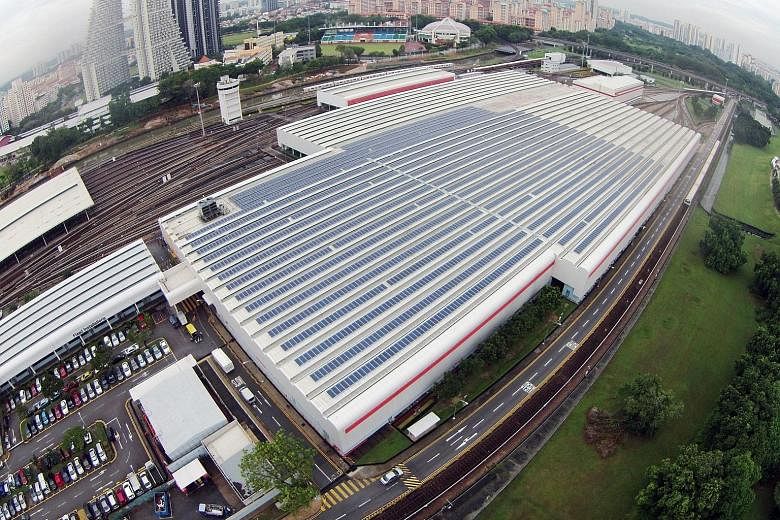More companies here are jumping on the lucrative sustainability bandwagon amid booming demand and opportunities for businesses that are both profitable and eco-friendly.
The attraction is all the greater as Asia, which has seen economic transformation in recent decades, is poised for further growth.
One such player is home-grown start-up Smart Animal Husbandry Care (SmartAHC). The agri-tech firm, set up in 2014 out of Nanyang Technological University, designs sensors and equipment that can collect and use data for "smart farming", or what it calls precision agriculture.
Co-founder Howard Tang told The Straits Times: "When people talk about sustainability, they often think about recycling and reusing.
"But for the livestock farming industry, sustainability is also about maximising output while making sure the livestock are raised in a healthy ecosphere. Broadly, it's about being able to meet Asia's growing food consumption needs."
SmartAHC, which is currently focused on the pig farming industry in China, has come up with a health-monitoring system that uses a wireless ear tag to collect real-time data from farm pigs, such as the animals' temperatures, physical activities and mating cycles.
This allows farmers to better identify the best mating time for their pigs, instead of having to perform manual checks. It also helps them detect early warning signs of disease, reducing the risks of outbreaks.
The company is working with three farms in China with about 120,000 pigs in total, and has received queries from chicken farms in Singapore on its technology.
It has garnered 8.2 million yuan (S$1.7 million) in funding from two undisclosed investors in China, as well as $500,000 from Singapore-based GreenMeadows Accelerator and Spring Singapore with an option for another $500,000.
The firm expects to turn revenue-positive this year.
-
$6.9t How much businesses in Asia could unlock in market opportunities by 2030 by implementing a few key development goals.
230m Number of jobs that could be created.
Mr Tang is optimistic about Asia's growth prospects.
In China, for example, 100 million people are in the middle class, which is expected to quadruple in size in the next 35 years to about 400 million, he noted.
"Our vision is to become the key technology supplier in the farming industry for most pig farmers in the region," Mr Tang said, pointing out that Asia is home to more than half of the world's farm pig population.
Indeed, the business case for pursuing profit in a manner that is aligned with sustainable development has become increasingly compelling in recent years.
Businesses in Asia could unlock at least US$5 trillion (S$6.9 trillion) in market opportunities and create 230 million jobs by 2030 by implementing a few key development goals, said a report by the United Nations-linked Business and Sustainable Development Commission last week.
The report said Asia's unprecedented economic growth has helped to reduce poverty, but its future growth, prosperity and stability "are all under threat from the impact of a swelling list of environmental and social burdens".
"There is the opportunity to shape a safer, more prosperous world."
The report identified four key areas with the most significant opportunities - cities, energy and materials, food and agriculture, and health and well-being - and specific projects such as affordable housing, renewable energy, reducing food waste and sustainable aquaculture.
The US$5 trillion value is conservative and more value could come from other sectors, including information and communication technologies, education and consumer goods, it added.
The report noted about US$2.3 trillion could be found in China alone, US$1.1 trillion in India, and US$1.1 trillion in developing and emerging countries. The rest is in developed countries such as Australia, New Zealand, Japan, and South Korea.
For Singapore-based solar leasing company Sunseap Group, the biggest opportunity for now lies in neighbouring markets.
Said co-founder and director Lawrence Wu: "We see a lot of potential in South-east Asian countries such as Thailand, the Philippines, Indonesia, Cambodia and Vietnam.
"A growing economy and population means energy needs will substantially increase, and solar farms and solar rooftops have been identified as one of the sustainable solutions to these needs."
The firm has worked on several projects in Singapore, including the installation of a 1MWp solar photovoltaic system on SMRT's Bishan Depot, Singapore's first and largest rail depot. The project, completed last October, allows the depot to meet energy needs such as lighting and air-conditioning for its buildings and workshops.
It is also supplying all of tech giant Apple's Singapore operations with solar-powered energy - a first in South-east Asia.
Beyond Singapore, Sunseap has operations in Cambodia, Thailand, the Philippines, India, Malaysia and Australia. It is working with a local partner in Cambodia to complete the country's first solar farm, a 10 MWp project in Bavet City, Svay Rieng, for instance.
The goal is to power countries in Asia by clean energy, said Mr Wu, adding that the firm's research and development team is also working to develop off-grid and hybrid solutions with batteries for rural areas.
"We are seeing increased demand as more people become aware of the importance of clean energy and what it can do for businesses - be it cost savings, or creating a possible impact that can be extended to its various stakeholders," said Sunseap co-founder and director Frank Phuan.
Another firm that has incorporated sustainability as "a huge part of our DNA" is Imagene Labs, according to its managing director Wong Mun Yew. The firm analyses consumers' individual genetic profiles to come up with personalised and specially formulated skincare and vitamin products.
"There's a lot of talk around fast fashion but we're also in a world of 'fast skincare', which no one talks about," said Dr Wong.
"Consumers are bombarded with new brands every day, and it's not uncommon to hear of this idea of a 'beauty haul', where they buy a whole suitcase of products because it's fun to try different brands.
"However, they often end up with products that are not suitable for their skin, and then throw or give them away. This is a huge wastage and it is also bad for the environment," he said, adding that the same can be seen with mass-market vitamins.
Imagene Labs aims to change this by helping consumers understand their skin and nutrition needs at the genetic level, such as the specific ingredients they need and what they should avoid.
This will allow them to "buy skincare and vitamin products in a smart and targeted way without the need for trial and error", said Dr Wong.
Since its launch in Singapore last September, Imagene Labs has ventured into Malaysia, Hong Kong, Thailand and Indonesia.
Dr Wong declined to disclose revenue numbers, but said the firm expects to be profitable next year. It also plans to expand into more markets, including China.


